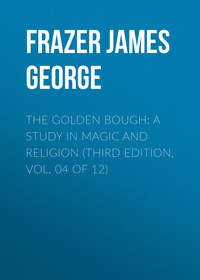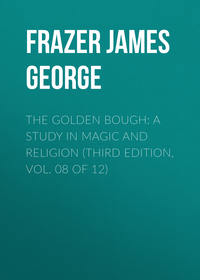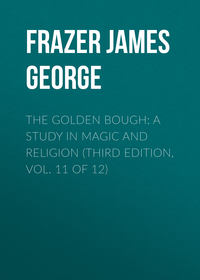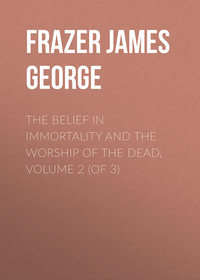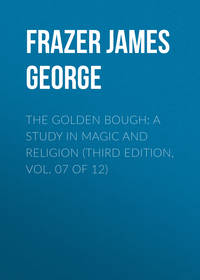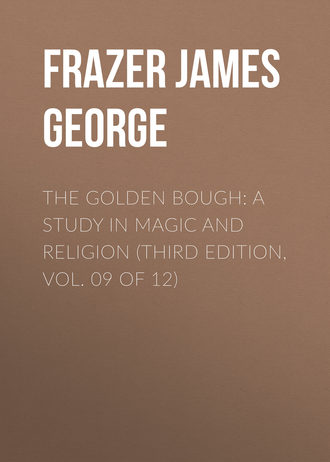 полная версия
полная версияThe Golden Bough: A Study in Magic and Religion (Third Edition, Vol. 09 of 12)
Annual expulsion of demons among the Hos of North-Eastern India at harvest.
Among the Hos of North-Eastern India the great festival of the year is the harvest home, held in January, when the granaries are full of grain, and the people, to use their own expression, are full of devilry. “They have a strange notion that at this period, men and women are so overcharged with vicious propensities, that it is absolutely necessary for the safety of the person to let off steam by allowing for a time full vent to the passions.” The ceremonies open with a sacrifice to the village god of three fowls, a cock and two hens, one of which must be black. Along with them are offered flowers of the Palas tree (Butea frondosa), bread made from rice-flour, and sesamum seeds. These offerings are presented by the village priest, who prays that during the year about to begin they and their children may be preserved from all misfortune and sickness, and that they may have seasonable rain and good crops. Prayer is also made in some places for the souls of the dead. At this time an evil spirit is supposed to infest the place, and to get rid of it men, women, and children go in procession round and through every part of the village with sticks in their hands, as if beating for game, singing a wild chant, and shouting vociferously, till they feel assured that the evil spirit must have fled. Then they give themselves up to feasting and drinking rice-beer, till they are in a fit state for the wild debauch which follows. The festival now “becomes a saturnale, during which servants forget their duty to their masters, children their reverence for parents, men their respect for women, and women all notions of modesty, delicacy, and gentleness; they become raging bacchantes.” Usually the Hos are quiet and reserved in manner, decorous and gentle to women. But during this festival “their natures appear to undergo a temporary change. Sons and daughters revile their parents in gross language, and parents their children; men and women become almost like animals in the indulgence of their amorous propensities.” The festival is not held simultaneously in all the villages. The time during which it is celebrated in the different villages of a district may be from a month to six weeks, and by a preconcerted arrangement the celebration begins at each village on a different date and lasts three or four days; so the inhabitants of each may take part in a long series of orgies. On these occasions the utmost liberty is given to the girls, who may absent themselves for days with the young men of another village; parents at such times never attempt to lay their daughters under any restraint. The Mundaris, kinsmen and neighbours of the Hos, keep the festival in much the same manner. “The resemblance to a Saturnale is very complete, as at this festival the farm labourers are feasted by their masters, and allowed the utmost freedom of speech in addressing them. It is the festival of the harvest home; the termination of one year's toil, and a slight respite from it before they commence again.”359
Annual expulsion of demons among the Hindoo Koosh tribes at harvest. Annual expulsion of demons among the Khonds at sowing.
Amongst some of the Hindoo Koosh tribes, as among the Hos and Mundaris, the expulsion of devils takes place after harvest. When the last crop of autumn has been got in, it is thought necessary to drive away evil spirits from the granaries. A kind of porridge called mool is eaten, and the head of the family takes his matchlock and fires it into the floor. Then, going outside, he sets to work loading and firing till his powder-horn is exhausted, while all his neighbours are similarly employed. The next day is spent in rejoicings. In Chitral this festival is called “devil-driving.”360 On the other hand the Khonds of India expel the devils at seed-time instead of at harvest. At this time they worship Pitteri Pennu, the god of increase and of gain in every shape. On the first day of the festival a rude car is made of a basket set upon a few sticks, tied upon bamboo rollers for wheels. The priest takes this car first to the house of the lineal head of the tribe, to whom precedence is given in all ceremonies connected with agriculture. Here he receives a little of each kind of seed and some feathers. He then takes the car to all the other houses in the village, each of which contributes the same things. Lastly, the car is conducted to a field without the village, attended by all the young men, who beat each other and strike the air violently with long sticks. The seed thus carried out is called the share of the “evil spirits, spoilers of the seed.” “These are considered to be driven out with the car; and when it and its contents are abandoned to them, they are held to have no excuse for interfering with the rest of the seed-corn.” Next day each household kills a hog over the seed for the year, and prays to Pitteri Pennu, saying, “O Pitteri Pennu! this seed we shall sow to-morrow. Some of us, your suppliants, will have a great return, some a small return. Let the least favoured have a full basket, let the most favoured have many baskets. Give not this seed to ant, or rat, or hog. Let the stems which shall spring from it be so stout that the earth shall tremble under them. Let the rain find no hole or outlet whereby to escape from our fields. Make the earth soft like the ashes of cow-dung. To him who has no iron wherewith to shoe his plough, make the wood of the doh-tree like iron. Provide other food than our seed for the parrot, the crow, and all the fowls and beasts of the jungle. Let not the white ant destroy the roots, nor the wild hog crush the stem to get at the fruit; and make our crops of all kinds have a better flavour than that of those of any other country.” The elders then feast upon the hogs. The young men are excluded from the repast, but enjoy the privilege of waylaying and pelting with jungle-fruit their elders as they return from the feast. Upon the third day the lineal head of the tribe goes out and sows his seed, after which all the rest may do so.361
Annual expulsion of disease in Chota Nagpur. Annual expulsion of demons among the Mossos of China.
In Ranchi, a district of Chota Nagpur in Bengal, a ceremony is performed every year by one of the clans to drive away disease. Should it prove ineffectual, all the villagers assemble by night and walk about the village in a body armed with clubs, searching for the disease. Everything they find outside of the houses they smash. Hence on that day the people throw out their chipped crockery, old pots and pans, and other trash into the courtyard, so that when the search party comes along they may belabour the heap of rubbish to their heart's content; the crash of shattered crockery and the clatter of shivered pans indicates, we are told, that the disease has departed; perhaps it might be more strictly accurate to say that they have frightened it away. At all events a very loud noise is made “so that the disease may not remain hidden anywhere.”362 In a village of the Mossos, an aboriginal tribe of south-western China, a French traveller witnessed the annual ceremony of the expulsion of devils. Two magicians, wearing mitres of red pasteboard, went from house to house, attended by a troop of children, their faces smeared with flour, some of whom carried torches and others cymbals, while all made a deafening noise. After dancing a wild dance in the courtyard of the house, they entered the principal room, where the performers were regaled with a draught of ardent spirits, of which they sprinkled a few drops on the floor. Then the magicians recited their spells to oblige the evil spirits to quit the chamber and the good spirits to enter it. At the end of each phrase, the children, speaking for the spirits, answered with a shout, “We go” or “We come.” That concluded the ceremony in the house, and the noisy procession filed out to repeat it in the next.363
Periodical expulsion of demons in Bali.
The people of Bali, an island to the east of Java, have periodical expulsions of devils upon a great scale. Generally the time chosen for the expulsion is the day of the “dark moon” in the ninth month. When the demons have been long unmolested the country is said to be “warm,” and the priest issues orders to expel them by force, lest the whole of Bali should be rendered uninhabitable. On the day appointed the people of the village or district assemble at the principal temple. Here at a cross-road offerings are set out for the devils. After prayers have been recited by the priests, the blast of a horn summons the devils to partake of the meal which has been prepared for them. At the same time a number of men step forward and light their torches at the holy lamp which burns before the chief priest. Immediately afterwards, followed by the bystanders, they spread in all directions and march through the streets and lanes crying, “Depart! go away!” Wherever they pass, the people who have stayed at home hasten, by a deafening clatter on doors, beams, rice-blocks, and so forth, to take their share in the expulsion of devils. Thus chased from the houses, the fiends flee to the banquet which has been set out for them; but here the priest receives them with curses which finally drive them from the district. When the last devil has taken his departure, the uproar is succeeded by a dead silence, which lasts during the next day also. The devils, it is thought, are anxious to return to their old homes, and in order to make them think that Bali is not Bali but some desert island, no one may stir from his own abode for twenty-four hours. Even ordinary household work, including cooking, is discontinued. Only the watchmen may shew themselves in the streets. Wreaths of thorns and leaves are hung at all the entrances to warn strangers from entering. Not till the third day is this state of siege raised, and even then it is forbidden to work at the rice-fields or to buy and sell in the market. Most people still stay at home, striving to while away the time with cards and dice.364
Annual expulsion of the fire-spirit among the Shans. Annual ceremony in Fiji. Annual ceremony in Tumleo.
The Shans of Southern China annually expel the fire-spirit. The ceremony was witnessed by the English Mission under Colonel Sladen on the thirteenth of August 1868. Bullocks and cows were slaughtered in the market-place; the meat was all sold, part of it was cooked and eaten, while the rest was fired out of guns at sundown. The pieces of flesh which fell on the land were supposed to become mosquitoes, those which fell in the water were believed to turn into leeches. In the evening the chief's retainers beat gongs and blew trumpets; and when darkness had set in, torches were lit, and a party, preceded by the musicians, searched the central court for the fire-spirit, who is supposed to lurk about at this season with evil intent. They then ransacked all the rooms and the gardens, throwing the light of the torches into every nook and corner where the evil spirit might find a hiding-place.365 In some parts of Fiji an annual ceremony took place which has much the aspect of an expulsion of devils. The time of its celebration was determined by the appearance of a certain fish or sea-slug (balolo) which swarms out in dense shoals from the coral reefs on a single day of the year, usually in the last quarter of the moon in November. The appearance of the sea-slugs was the signal for a general feast at those places where they were taken. An influential man ascended a tree and prayed to the spirit of the sky for good crops, fair winds, and so on. Thereupon a tremendous clatter, with drumming and shouting, was raised by all the people in their houses for about half an hour. This was followed by a dead quiet for four days, during which the people feasted on the sea-slug. All this time no work of any kind might be done, not even a leaf plucked nor the offal removed from the houses. If a noise was made in any house, as by a child crying, a forfeit was at once exacted by the chief. At daylight on the expiry of the fourth night the whole town was in an uproar; men and boys scampered about, knocking with clubs and sticks at the doors of the houses and crying “Sinariba!” This concluded the ceremony.366 The natives of Tumleo, a small island off German New Guinea, also catch the sea-slug in the month of November, and at this season they observe a curious ceremony, which may perhaps be explained as an expulsion of evils or demons. The lads, and sometimes grown men with them, go in troops into the forest to search for grass-arrows (räng). When they have collected a store of these arrows, they take sides and, armed with little bows, engage in a regular battle. The arrows fly as thick as hail, and though no one is killed, many receive skin wounds and are covered with blood. The Catholic missionary who reports the custom could not ascertain the reasons for observing it. Perhaps one set of combatants represents the demons or embodied evils of the year, who are defeated and driven away by the champions of the people. The month in which these combats take place (November and the beginning of December) is sometimes named after the grass-arrows and sometimes after the sea-slug.367
Annual expulsion of demons in Japan.
On the last night of the year there is observed in most Japanese houses a ceremony called “the exorcism of the evil spirit.” It is performed by the head of the family. Clad in his finest robes, with a sword, if he has the right of bearing one, at his waist, he goes through all the rooms at the hour of midnight, carrying in his left hand a box of roasted beans on a lacquered stand. From time to time he dips his right hand into the box and scatters a handful of beans on a mat, pronouncing a cabalistic form of words of which the meaning is, “Go forth, demons! Enter riches!”368 According to another account, the ceremony takes place on the night before the beginning of spring, and the roasted beans are flung against the walls as well as on the floors of the houses.369 While the duty of expelling the devils should, strictly speaking, be discharged by the head of the house, it is often delegated to a servant. Whether master or servant, the performer goes by the name of year-man (toshi-otoko), the rite being properly performed on the last day of the year. The words “Out with the devils” (Oni ha soto) are pronounced by him in a loud voice, but the words “In with the luck” (fuku ha uchi) in a low tone. In the Shogun's palace the ceremony was performed by a year-man specially appointed for the purpose, who scattered parched beans in all the principal rooms. These beans were picked up by the women of the palace, who wrapped as many of them in paper as they themselves were years old, and then flung them backwards out of doors. Sometimes people who had reached an unlucky year would gather these beans, one for each year of their life and one over, and wrap them in paper together with a small copper coin which had been rubbed over their body to transfer the ill-luck. The packet was afterwards thrown away at a cross-road. This was called “flinging away ill-luck” (yaku sute).370 According to Lafcadio Hearn, the casting-out of devils from the houses is performed by a professional exorciser for a small fee, and the peas which he scatters about the house are afterwards swept up and carefully kept until the first peal of thunder is heard in spring, when it is customary to cook and eat some of them. After the demons have been thoroughly expelled from a house, a charm is set up over the door to prevent them from returning: it consists of a wooden skewer with a holly leaf and the dried head of a fish like a sardine stuck on it.371
Annual expulsion of poverty and demons in China, India, and Persia.
On the third day of the tenth month in every year the Hak-Ka, a native race in the province of Canton, sweep their houses and turn the accumulated filth out of doors, together with three sticks of incense and some mock money made of paper. At the same time they call out, “Let the devil of poverty depart! Let the devil of poverty depart!” By performing this ceremony they hope to preserve their homes from penury.372 Among some of the Hindoos of the Punjaub on the morning after Diwali or the festival of lamps, at which the souls of ancestors are believed to visit the house, the oldest woman of the family takes a corn-sieve or winnowing basket and a broom, to both of which magical virtues are ascribed, and beats them in every corner of the house, exclaiming, “God abide, and poverty depart!” The sieve is then carried out of the village, generally to the east or north, and being thrown away is supposed to bear away with it the poverty and distress of the household. Or the woman flings all the sweepings and rubbish out of doors, saying, “Let all dirt and wretchedness depart from here, and all good fortune come in.”373 The Persians used annually to expel the demons or goblins (Dives) from their houses in the month of December. For this purpose the Magi wrote certain words with saffron on a piece of parchment or paper and then held the writing over a fire into which they threw cotton, garlic, grapes, wild rue, and the horn of an animal that had been killed on the sixteenth of September. The spell thus prepared was nailed or glued to the inside of the door, and the door was painted red. Next the priest took some sand and spread it out with a knife, while he muttered certain prayers. After that he strewed the sand on the floor, and the enchantment was complete. The demons now immediately vanished, or at least were deprived of all their malignant power.374
Annual expulsion of demons in China at the end of the year.
For ages it has been customary in China to expel the demons from house and home, from towns and cities, at the end of every year. Such general expulsions of devils go by the name of no. They are often mentioned and described in Chinese literature. For example, under the Han dynasty, in the second century of our era, “it was ordered that fang-siang shi with four eyes of gold, masked with bearskins, and wearing black coats with red skirts, bearing lances and brandishing shields, should always perform at the end of the year in the twelfth month the no of the season, in the rear of hundreds of official servants and boys, and search the interior of the palace, in order to expel the demons of plague. With bows of peach wood and arrows of the thorny jujube they shoot at the spectres, and with porcelain drums they drum at them; moreover they throw red balls and cereals at them, in order to remove disease and calamity.”375 Again, in a poem of the same period we read that “at the end of the year the great no takes place for the purpose of driving off all spectres. The fang-siang carry their spears, wu and hih hold their bundles of reed. Ten thousand lads with red heads and black clothes, with bows of peach wood and arrows of thorny jujube shoot at random all around. Showers of potsherds and pebbles come down like rain, infallibly killing strong spectres as well as the weak. Flaming torches run after these beings, so that a sparkling and streaming glare chases the red plague to all sides; thereupon they destroy them in the imperial moats and break down the suspension bridges (to prevent their return).”376 At a later period Chinese historians inform us that the house of Tsi caused the annual expulsion of demons to be performed on the last day of the year by two groups, each of one hundred and twenty lads, and twelve animals headed by drums and wind instruments. The gates of the wards and of the city walls were flung open, and the emperor witnessed the ceremony seated on his throne in the midst of his officers. With rolling drums the procession entered the palace through the western gate, and passed through all parts of it in two divisions, even ascending the towers, while they hopped, jumped and shrieked; and on quitting the palace they spread out in six directions till they reached the city walls.377 At the present time it is customary in every part of China to fire off crackers on the last day and night of the year for the purpose of terrifying and expelling the devils: enormous quantities of the explosives are consumed at this season: the people seem to vie with one another as to who shall let off the most crackers and make the most noise. Sometimes long strings of these fireworks hang from balconies and eaves and keep up a continuous crackling for half an hour together or more; in great cities the prolonged and ear-splitting din is very annoying to foreigners. To the ears of the Chinese the noise appears to be agreeable, if not for its own sake, at least for the beneficial effect it is supposed to produce by driving demons away. Indeed they seem to be of opinion that any noise, provided it be sufficiently harsh and loud, serves this useful purpose. The sound of brass instruments is particularly terrifying to devils; hence the great use which the Chinese make of gongs in rites of exorcism. The clash of gongs, we are told, resounds through the Chinese empire daily, especially in summer, when a rise in the death-rate, which ignorant Europeans attribute to mere climatic influences, stimulates the people to redouble their efforts for the banishment of the fiends, who are the real cause of all the mischief. At such times you may see and hear groups of benevolent and public-spirited men and women banging gongs, clashing cymbals, and drubbing drums for hours together. No protest is made by their neighbours, no complaint that they disturb the night's rest of the sick and the tired. People listen with resignation or rather with gratitude and complacency to the deafening uproar raised by these generous philanthropists, who thus devote their services gratuitously to the cause of the public health.378 In Corea, also, the devils are driven out of the towns on New Year's Eve by the firing of guns and the popping of crackers.379
Annual expulsion of demons in Tonquin.
In Tonquin a theckydaw or general expulsion of malevolent spirits commonly took place once a year, especially if there was a great mortality amongst men, the elephants or horses of the general's stable, or the cattle of the country, “the cause of which they attribute to the malicious spirits of such men as have been put to death for treason, rebellion, and conspiring the death of the king, general, or princes, and that in revenge of the punishment they have suffered, they are bent to destroy everything and commit horrible violence. To prevent which their superstition has suggested to them the institution of this theckydaw, as a proper means to drive the devil away, and purge the country of evil spirits.” The day appointed for the ceremony was generally the twenty-fifth of February, one month after the beginning of the new year, which fell on the twenty-fifth of January. The intermediate month was a season of feasting, merry-making of all kinds, and general licence. During the whole month the great seal was kept shut up in a box, face downwards, and the law was, as it were, laid asleep. All courts of justice were closed; debtors could not be seized; small crimes, such as petty larceny, fighting, and assault, escaped with impunity; only treason and murder were taken account of and the malefactors detained till the great seal should come into operation again. At the close of the saturnalia the wicked spirits were driven away. Great masses of troops and artillery having been drawn up with flying colours and all the pomp of war, “the general beginneth then to offer meat offerings to the criminal devils and malevolent spirits (for it is usual and customary likewise amongst them to feast the condemned before their execution), inviting them to eat and drink, when presently he accuses them in a strange language, by characters and figures, etc., of many offences and crimes committed by them, as to their having disquieted the land, killed his elephants and horses, etc., for all which they justly deserve to be chastised and banished the country. Whereupon three great guns are fired as the last signal; upon which all the artillery and musquets are discharged, that, by their most terrible noise the devils may be driven away; and they are so blind as to believe for certain, that they really and effectually put them to flight.”380
Annual expulsion of demons in Cambodia and Siam.
In Cambodia the expulsion of evil spirits took place in March. Bits of broken statues and stones, considered as the abode of the demons, were collected and brought to the capital. Here as many elephants were collected as could be got together. On the evening of the full moon volleys of musketry were fired and the elephants charged furiously to put the devils to flight. The ceremony was performed on three successive days.381 In Siam the banishment of demons is annually carried into effect on the last day of the old year. A signal gun is fired from the palace; it is answered from the next station, and so on from station to station, till the firing has reached the outer gate of the city. Thus the demons are driven out step by step. As soon as this is done a consecrated rope is fastened round the circuit of the city walls to prevent the banished demons from returning. The rope is made of tough couch-grass and is painted in alternate stripes of red, yellow, and blue.382 According to a more recent account, the Siamese ceremony takes place at the New Year holidays, which are three in number, beginning with the first of April. For the feasting which accompanies these holidays a special kind of cake is made, “which is as much in demand as our own Shrove-Tuesday pancakes or our Good-Friday hot cross-buns. The temples are thronged with women and children making offerings to Buddha and his priests. The people inaugurate their New Year with numerous charitable and religious deeds. The rich entertain the monks, who recite appropriate prayers and chants. Every departed soul returns to the bosom of his family during these three days, freed from any fetters that may have bound him in the regions of indefinable locality. On the third day the religious observances terminate, and the remaining hours are devoted to ‘the world, the flesh, and the devil.’ Gambling is not confined to the licensed houses, but may be indulged in anywhere. Games of chance hold powerful sway in every house as long as the licence to participate in them lasts. Priests in small companies occupy posts at regular intervals round the city wall, and spend their time in chanting away the evil spirits. On the evening of the second day, the ghostly visitors from the lower realms lose the luxury of being exorcised with psalms. Every person who has a gun may fire it as often as he pleases, and the noise thus made is undoubtedly fearful enough in its intensity to cause any wandering traveller from the far-off fiery land to retrace his steps with speed. The bang and rattle of pistols, muskets, shot-guns, and rifles cease not till the break of day, by which time the city is effectually cleared of all its infernal visitors.”383 From this account we learn that among the spirits thus banished are the souls of the dead, who revisit their living friends once a year. To the same effect, apparently, Bishop Bruguière, writing from Bangkok in 1829, tells us that “the three first days of the moon of April are days of solemn festivity for the pious Siamese. That day Lucifer opens all the gates of the abyss, the souls of the dead, which are shut up there, come forth and partake of a repast in the bosom of their family. They are treated splendidly. One of these three days a monk repairs to the palace to preach before the king. At the end of the sermon a preconcerted signal is given, and in a moment the cannons are fired in all the quarters of the city to chase the devil out of the walls or to kill him, if he dares to resist. On the first day a temporary king is named, who bears the title of phaja-phollathep; during these three days he enjoys all the royal prerogatives, the real king remaining shut up in his palace.”384


